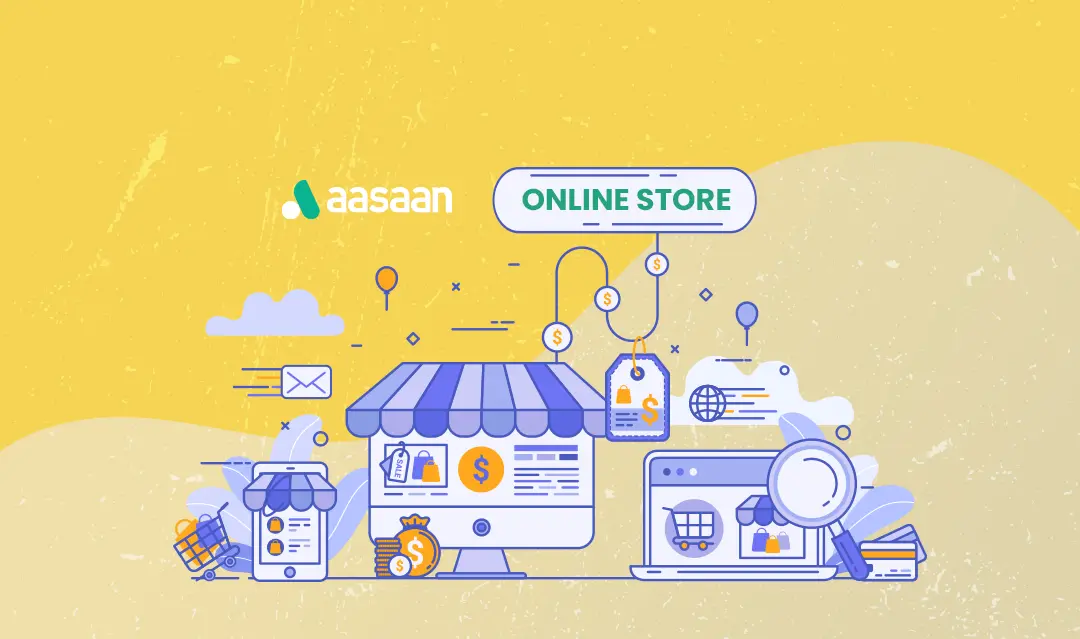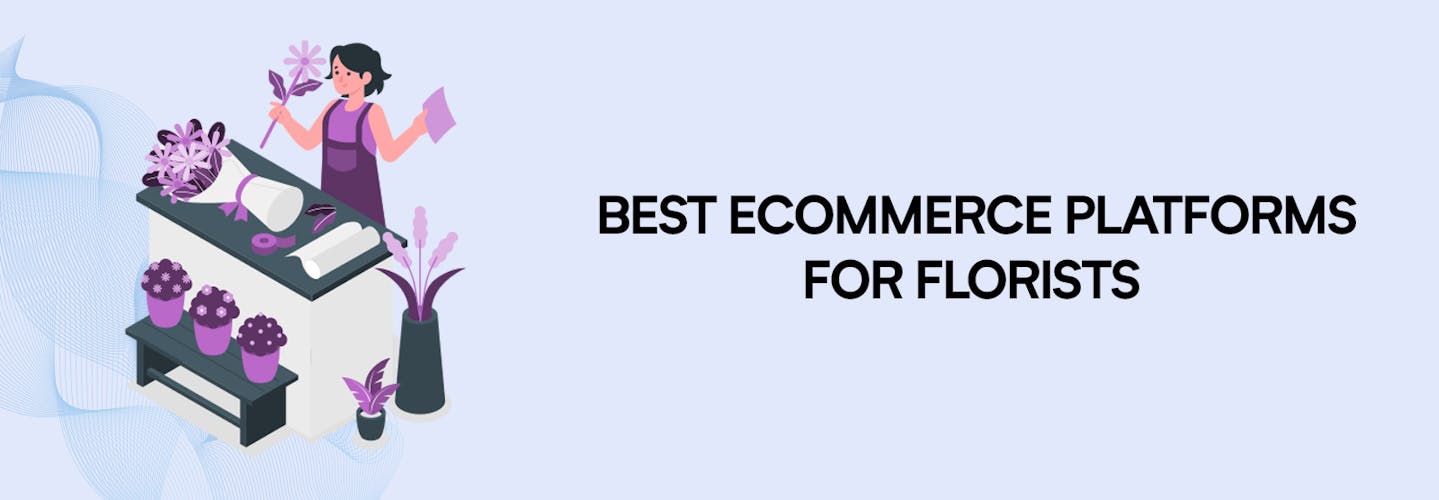
6 Best Ecommerce Platforms For Florists in 2025
In the realm of online business, e-commerce platforms stand as invaluable tools to help entrepreneurs achieve their aspirations of building successful ventures.
While the journey to establishing a business empire requires dedication and time, it also demands a sense of dignity and trust.
The landscape of success is not unfamiliar, encompassing strategic marketing efforts and the creation of an official website to offer customers direct access to products.
But, how can one navigate these challenges and achieve triumph in the competitive world of floristry?
The answer lies within the realm of e-commerce platforms a gateway to unlocking the potential of any business.
Unleashing the Blossoming Potential:
The world is adorned with countless florists, each vying for their place in the market.
To ascend the ladder of success, one must delve deep into market analysis, devising the perfect sales plan.
Notably, recurring events and special occasions such as Valentine’s Day, Mother’s Day, and Anniversaries fuel the demand for exquisite floral arrangements.
Standing out amidst the sea of competitors requires innovative designs and meticulous marketing strategies.
Crafting an e-commerce site that serves as an informational hub for your offerings is imperative.
The online realm is a visual feast, and your products must be showcased through captivating images and compelling descriptions.
Infusing colors and designs into your website can entice customers to make purchases, transforming virtual visitors into loyal patrons.
The Path to Flourish Online:
Embarking on an e-commerce journey requires both time and financial investment, but the process can be streamlined with the aid of user-friendly platforms.
These platforms have empowered countless entrepreneurs to establish remarkable and thriving florist websites.
Why Ecommerce is Essential for Modern Florists

The world has witnessed a seismic shift in shopping behaviors over the past decade. With the convenience of online shopping, consumers are increasingly turning to the web to find and purchase products, and flowers are no exception. Here’s why embracing ecommerce is non-negotiable for today’s florists:
- Wider Audience Reach: Unlike a brick-and-mortar store limited by geography, an online flower shop can reach customers from all corners of the globe. Whether it’s a husband in New York ordering roses for his wife in Paris or a daughter in Tokyo sending lilies to her mother in Sydney, the world becomes your marketplace.
- Increased Sales Opportunities: With the ability to operate 24/7, your online store can generate sales even when you’re asleep. Plus, special occasions like Valentine’s Day, Mother’s Day, and anniversaries can see a surge in online orders, maximizing your revenue potential.
- Digital Marketing Potential: Ecommerce platforms often come with built-in marketing tools. From email marketing campaigns showcasing your latest floral arrangements to targeted ads reaching potential customers, the digital realm offers a plethora of marketing opportunities.
- Customer Convenience: In today’s fast-paced world, customers appreciate the ease of browsing flower arrangements, reading reviews, and making purchases at their leisure, all from the comfort of their homes.
- Insights and Analytics: Most ecommerce platforms provide analytics, giving you valuable insights into customer behavior, popular products, and sales trends. This data can guide your business strategies and inventory decisions.
By establishing a flower ecommerce website, florists not only meet current market demands but also future-proof their businesses against changing consumer behaviors.
In the next section, we’ll explore the key features to consider when choosing an ecommerce platform tailored to the needs of florists.
Key Features to Look for in an Ecommerce Platform for Florists
Selecting the right ecommerce platform is akin to choosing the perfect soil for your flowers—it can significantly impact growth.
For florists, certain features are indispensable to ensure a seamless online experience for both the seller and the buyer. Here’s what to look for:
- User-Friendly Interface: The platform should be intuitive, allowing you to easily upload product images, set prices, manage inventory, and process orders. Similarly, customers should find it straightforward to browse, select, and purchase products.
- Integration Capabilities: As a florist, you might collaborate with various suppliers and delivery services. The platform should allow easy integrations, ensuring timely restocks and prompt deliveries.
- Mobile Optimization: A significant portion of online shopping happens on mobile devices. Ensure the platform offers a responsive design, providing a seamless shopping experience across all device types.
- Customization Options: Your online store should reflect your brand’s identity. Opt for platforms that offer customization options, from color schemes to layout designs, allowing you to create a unique online presence.
- Secure Payment Gateways: Trust is paramount in online transactions. Ensure the platform supports multiple, secure payment methods, giving customers confidence in their purchases.
- SEO Features: Given the importance of search engine visibility, the platform should come equipped with SEO tools. This includes customizable URLs, meta descriptions, and alt text options for images.
- Reviews and Testimonials: Customers often rely on reviews before making a purchase. A built-in review system can enhance credibility and boost sales.
- Inventory Management: Real-time inventory updates prevent overselling and ensure customers always have access to their desired floral arrangements.
- Marketing and Promotional Tools: From discount codes to holiday promotions, the platform should support various marketing strategies to attract and retain customers.
- Analytics and Reporting: Understand your sales patterns, customer preferences, and website traffic with comprehensive analytics. This data can be invaluable for future business strategies.
READ MORE: 8 Best eCommerce Platforms For Electronics
6 Best Ecommerce solutions for florists to sell flowers online
1. Aasaan: Commerce Simplified
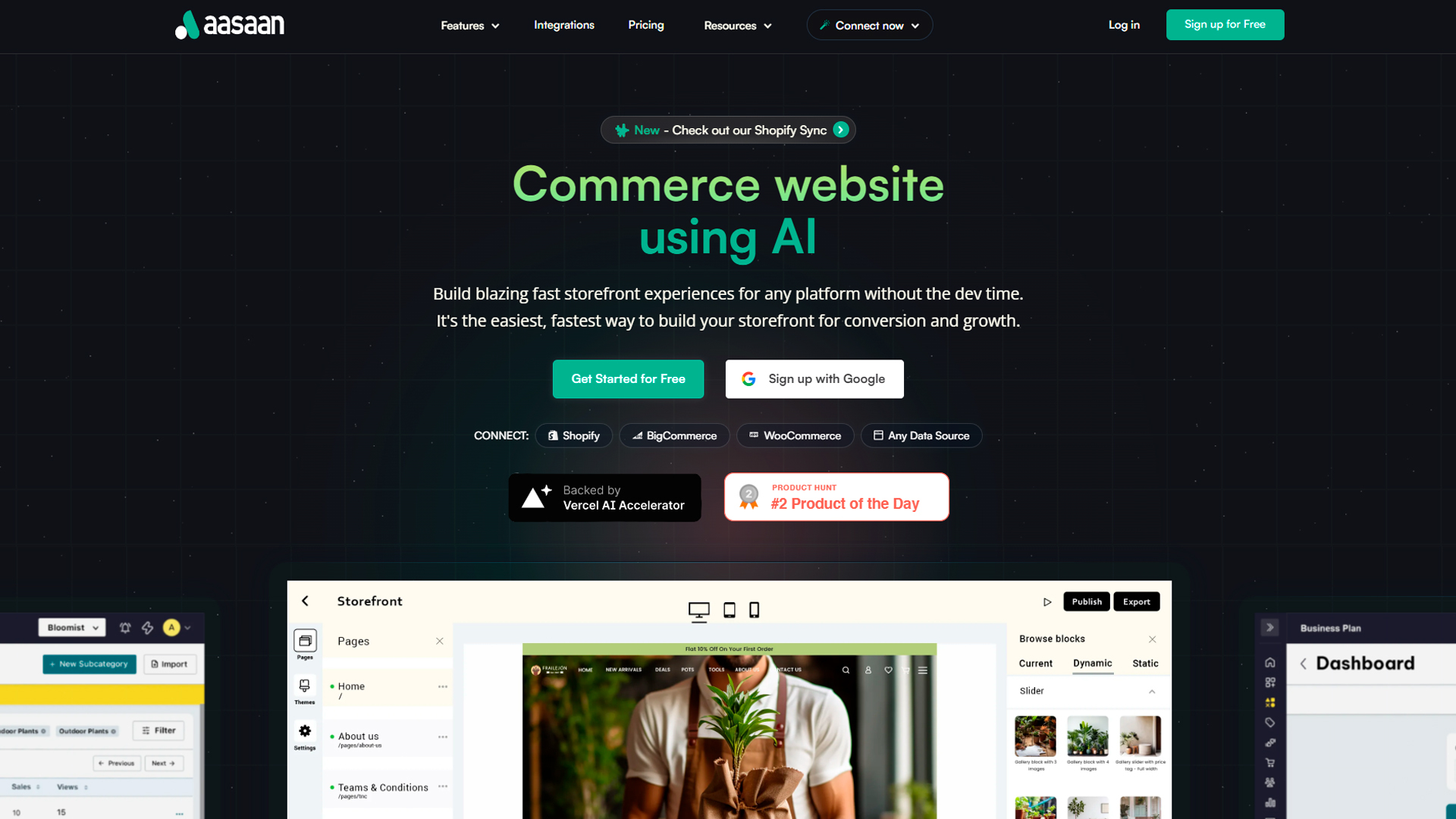
On the mission of simplifying online commerce, Aasaan bursts onto the scene as a valuable ally for fledgling florists. Building your very own e-commerce site is labor-understandable to the uninitiated — but Aasaan makes navigating those hurdles easy.
It is an encompassing solution for florists who wish for a simplified yet strong online sales aspect. Through innovative design aspects and easy-to-use selling tools, Aasaan is rewriting the traditional conception of what it means to run an online florist store.
Similar to renowned platforms, Aasaan offers benefits like varied payment options, marketing options, merchandise management, and customer guidance - but with an especially user-friendly approach.
The platform enables even someone with limited tech skills to effectively set up an engaging website portraying their products alluringly. There’s also a built-in SEO tool to aid in perfectly piping in organic traffic.
Despite its simplicity, Aasaan notably covers all key aspects of running an engaging, sales-driving online site, elevating it onto the list of desirable e-commerce tools for florists.
Essentially, Aasaan places importance on opening doors to complex online ventures while erasing intimidating technological intricacies.
For those who admire the beauty in simplicity, yet desire power in robustness, Aasaan performs with flying colors, immortalizing it as part and parcel of the best e-commerce solutions for occupying online space as florists.
Pricing:
- Premium: Priced at $50 per month, this plan is for merchants and startups to help grow their business with branding.
- Business: At $165 per month, this plan is for advanced merchants and includes everything in the Premium plan, plus branded iOS and Android apps, full store access via backend API, webhooks, 5 inventory locations, 10 staff accounts, and unlimited integrations.
- Enterprise: This plan is designed for D2C brands looking for unlimited scalability, greater control, and dedicated resources. It includes everything in the Business plan, plus self-hosted storefronts for high performance, custom storefront themes, custom integrations, and 100% uptime SLA. The pricing for this plan is available upon contacting sales
2. FloristWare Crafting Floral Magic Online
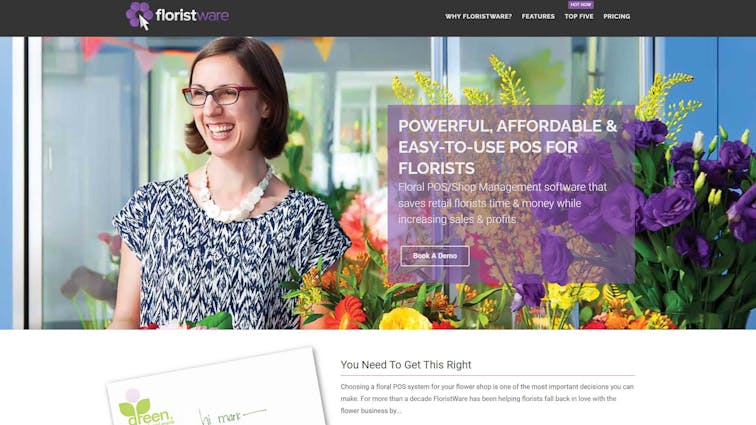
FloristWare emerges as a potent software solution equipped with the tools necessary to create unparalleled global e-commerce experiences. Through FloristWare, crafting an enticing online store becomes a breeze, beckoning visitors to explore and engage. Captivating design is pivotal it’s the hook that draws visitors in, allowing your products to shine.
FloristWare empowers even non-experts to weave magic. As an entrepreneur, you need not be a technical savant. Focus on refining your marketing strategies and harness the prowess of this software to propel your floral business towards triumph.
Pricing:
- Basic: $149 per month or $1499 per year
- Advanced: $199 per month or $1999 per year
- Enterprise: $500 per month or $5000 per year
3. Shopify The Crown Jewel of Sales

Shopify is hailed as the monarch of sales-centric e-commerce platforms. The user-friendly interface caters to beginners, eliminating the need for intricate design skills. If you lack web development expertise, Shopify emerges as your champion.
Embarking on your Shopify journey is a breeze. From signing up with your email to exploring the platform during a two-week free trial, Shopify ensures you acclimate yourself before diving in. Shopify facilitates domain acquisition, simplifying the process of creating a personalized web identity.
The allure of Shopify lies in its flexibility. With diverse packages and pricing options, you can choose the plan that aligns with your goals. Security-conscious entrepreneurs will appreciate Shopify’s commitment to safeguarding confidential information, enhancing the credibility of your online floral enterprise.
Pricing:
- Basic Shopify: $29/month - 2 staff accounts, inventory at up to 4 locations.
- Shopify: $79/month - 5 staff accounts, inventory at up to 5 locations.
- Advanced Shopify: $299/month - 15 staff accounts, inventory at up to 8 locations.
4. WordPress.org Crafting Elegance and Functionality
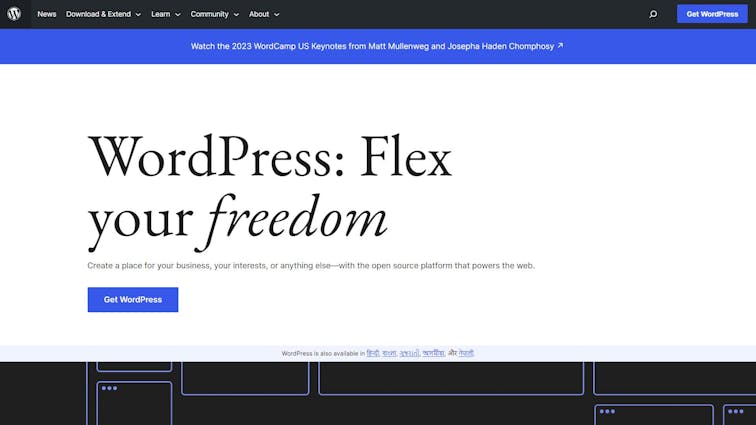
While WordPress is renowned as a content management system, it emerges as an excellent e-commerce platform option. WordPress simplifies the process of creating and maintaining websites, catering to beginners and those unfamiliar with technical intricacies.
Notably, the plugins system stands out. These software add-ons enhance your website’s capabilities, encompassing areas like marketing, SEO, social networks, and design.
Themes and widgets further elevate your website’s aesthetics and functionality, turning your floral-focused website into an exquisite online storefront.
Pricing:
- WordPress.org is a self-hosted platform, meaning users must host their websites with a chosen hosting provider.
- The core WordPress software is technically free, but some additional costs will occur.
- These costs include a domain name, a web hosting plan, and premium WordPress plugins and themes.
- The estimated costs of a self-hosted WordPress site are as follows:
- Website Hosting: $1.99$29.99/month
- Domain Name: $0.99-39.99/year
- SSL Certificates: $0-1,000/year
- Premium Themes and Plugins: $2-1,000/license
5. WooCommerce A Floral Evolution
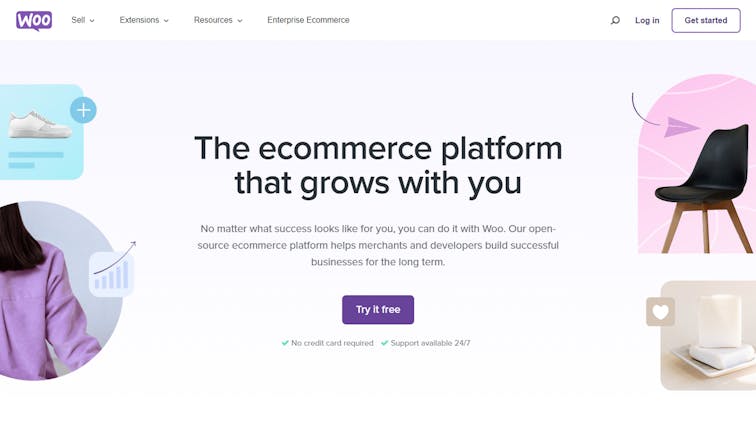
WooCommerce, a WordPress plugin, acts as a gateway to transform your website into a thriving online store.
Launched in 2011, WooCommerce’s popularity is evident through its numerous active installs. Seamlessly integrated with WordPress, WooCommerce offers an intuitive experience for those already acquainted with the content management system.
The ease of management and configuration, combined with its versatility, make WooCommerce a preferred choice.
As your floral inventory expands, WooCommerce evolves alongside, supporting unlimited product additions. Updates are frequent, ensuring smooth operations and continuous improvement.
Pricing:
WooCommerce is a free WordPress plugin. However, you’ll need to pay for additional fees to get started. These include:
- Domain name: About $12 per year
- Hosting service: $5-$25 per month
- SSL certificate
- Theme
- Design
- Plugins that help with store management
- Developer fees: $20-$150 per hour
6. BigCommerce Thinking Big for Blooms
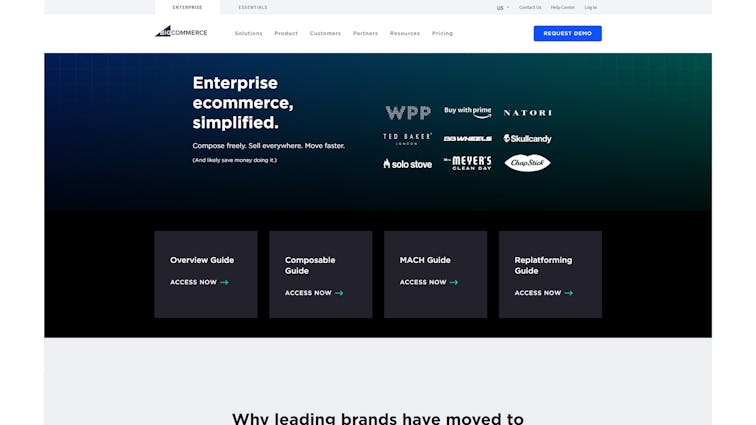
BigCommerce stands tall as an exceptional e-commerce platform for florists. The burgeoning florist market demands grand visions, and BigCommerce offers a wide array of affordable options to elevate your online presence.
This platform empowers florists to captivate their audience through attention-grabbing websites that drive sales.
Navigating the world of online retail requires wisdom and strategic planning. BigCommerce’s Store Design function grants you the power to preview your site’s aesthetics before finalizing your design.
Unlike platforms with limited functionality, BigCommerce boasts a robust suite of tools, enhancing your operational efficiency.
Beyond the digital realm, BigCommerce allows seamless integration of online and offline sales channels without relying on additional apps. This versatility makes it a stellar choice for florists looking to expand their reach.
With BigCommerce, you’re never alone. Technical support is readily available, ensuring your concerns are addressed promptly. While the learning curve may be steep, the platform’s potential is limitless a driving force behind your florist website’s success.
Pricing:
- Standard: $39 per month
- Plus: $105 per month
- Pro: Starting at $399 per month for less than $400k in online sales, +$150/mo for each additional $200k in online sales
- Enterprise: Pricing based on a customer’s online sales
How to Optimize Your Florist Ecommerce Website for Success ?
Once you’ve chosen the ideal platform, the journey doesn’t end there. Optimization is key to ensuring your online flower shop stands out in a blooming digital market. Here’s how to cultivate an online presence that flourishes:
- High-Quality Images: The beauty of your floral arrangements should shine through. Invest in professional photography and ensure images are clear, vibrant, and representative of your products. Remember to compress these images using tools like Squoosh to enhance page load speed without compromising on quality.
- Engaging Product Descriptions: Craft compelling descriptions for each floral arrangement. Highlight the inspiration behind each bouquet, the types of flowers used, and any special care instructions.
- Alt Text for Images: Enhance search engine understanding by adding descriptive alt text to all product images. This not only aids in SEO but also improves accessibility for visually impaired users.
- Internal Linking: Guide your visitors through a journey. If a customer is viewing a Valentine’s Day bouquet, link to related products or blog posts about choosing the perfect Valentine’s gift.
- SEO Best Practices: Ensure keyword placement is natural. Integrate LSI keywords like “florist ecommerce website” and “e commerce flower shop” seamlessly into your content. Avoid keyword stuffing and focus on creating value-driven content.
- Customer Reviews and Testimonials: Encourage satisfied customers to leave reviews. Showcase testimonials prominently, building trust with potential buyers.
- Promotions and Discounts: Offer seasonal promotions or discounts for first-time buyers. This not only incentivizes purchases but can also boost customer retention.
- Mobile Optimization: Ensure your website offers a seamless shopping experience on mobile devices. With many customers shopping on-the-go, a mobile-responsive design is crucial.
- Secure and Diverse Payment Options: Offer multiple payment methods, from credit cards to digital wallets, ensuring a smooth checkout process for all customers.
- Engage with Customers: Implement live chat support or chatbots to assist customers in real-time. Addressing queries promptly can lead to increased sales and enhanced customer satisfaction.
Conclusion:
Choosing the right e-commerce platform for your floristry business can seem an overwhelming task with a myriad of options available. The key to picking the ideal platform is to understand the specific needs and limitations of your business and match that with the features provided by the service.
Remember that web development skills are not always requisite—ease of use, pricing, customer service, and scaling capabilities are more important aspects. Never underestimate the power of customer reviews; they paint a clear picture of the platform’s strengths and weaknesses.
Pay attention to how each platform handles security issues, how quickly customer queries are responded to, whether or not it integrates with your business model, and how favorable their pricing points are.
Your chosen platform should ideally have the flair to nurture your visual branding while ensuring the smooth operation of your business. Whether it is Aasaan, Shopify’s robust security, WordPress’s state-of-the-art plugins, WooCommerce’s numerous active installs, or BigCommerce’s concessions for big visions, each has a role in painting your shop’s success story.
May the best blend of usability, abundant features, pocket-friendly pricing, excellent customer service, and scalability be a sound initial measure of the right e-commerce platform. Keep evolving with your business’ growth and soon you will discover the unbeatable combination that fits like a glove. Your perfect e-commerce platform is out there, ready to redefine your owner-florist journey with unexpected success.




